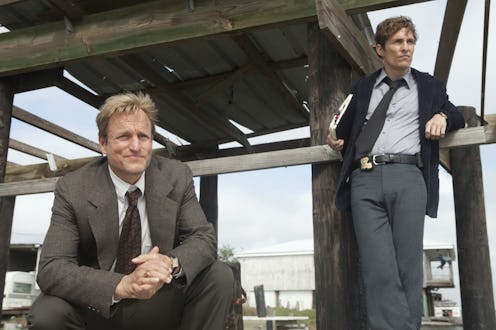Entertainment
Was 'True Detective' Plagiarized?

Sounds like a real case for a gumshoe. Time reports that True Detective creator Nic Pizzolatto has denied accusations of plagiarism. While you may be shocked to hear that that's even a consideration — the show is way too good to be a carbon copy of something else — let it be known that when an Internet voice makes a tiny sound, it can echo into a large, bellowing roar, echoing far enough into HBO's eardrums.
The Lovecraft eZine had written a blog post that asked, "Did the writer of True Detective plagiarize Thomas Ligotti and others?" in which the author wondered if Rust Cohle, Matthew McConnaughey's character, had spoken words that had been taken directly from writer Ligotti's work. The author of the post probably put out the question for the collective Internet to start attempting to answer — perhaps they were just trying to start a conversation — but the question raised did not please the network.
Naturally, HBO had to respond. The network issued a statement addressing the concern and Entertainment Weekly posted it.
True Detective is a work of exceptional originality and the story, plot, characters and dialogue are that of Nic Pizzolatto. Philosophical concepts are free for anyone to use, including writers of fiction, and there have been many such examples in the past. Exploring and engaging with ideas and themes that philosophers and novelists have wrestled with over time is one of the show’s many strengths—we stand by the show, its writing and Nic Pizzolatto entirely.
Pizolatto also issued a statement to defend his creative work, in which he said:
Nothing in the television show True Detective was plagiarized [...] The philosophical thoughts expressed by Rust Cohle do not represent any thought or idea unique to any one author; rather these are the philosophical tenets of a pessimistic, anti-natalist philosophy with an historic tradition including Arthur Schopenauer, Friedrich Nietzche, E.M. Cioran, and various other philosophers, all of whom express these ideas. As an autodidact pessimist, Cohle speaks toward that philosophy with erudition and in his own words. The ideas within this philosophy are certainly not exclusive to any writer.
Okay, so Cohle's words are an amalgam of thinkers' ideas, but that's not necessarily plagiarism. In fact, the birth of Cohle — a thinker in his own right — is simply the fusion of thoughts from various great thinkers of the past, as it often goes with fictional characters. Think of how House of Cards' political characters often seem like combinations of various politicians throughout history. Writers are often inspired by people, characters, and events in history, especially in works of fiction.
We take old stories and thoughts and put them into a new, modernized context. It's part of being a member of the creative community. Stealing others' work and crediting it as your own is different from being inspired by a variety of sources that came before you.
For now, it seems that HBO is on Pizzolatto's side. However, naysayers may have their claws out, ready to rip apart the text from Season 2, so we'll have to wait and see how it all pans out.
Images: HBO